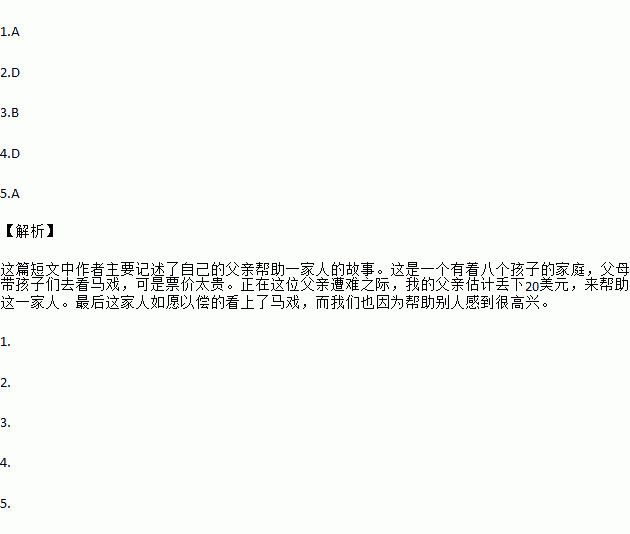题目内容
Once when I was a teenager,my father and I were standing in line to buy tickets for the circus(马戏).Finally,there was only one family between the ticket office and us.This family made a deep impression (印象)on me.There were eight children,all probably under the age of 12.You could tell they didn't have much money.Their clothes were not expensive,but they were clean.The children talked excitedly about the clowns,elephants and other acts they would see that night.I could tell they never saw the circus .It was clearly a very important day out for them.The father and mother seemed really happy.
The ticket lady told him the price.
The man's wife lowered her head.There was no longer a smile on the man's face.He quietly asked,"How much did you say?"
The ticket lady again told him the price.
The man obviously(明显地) didn't have enough money.But how could he tell his kids the bad news?
Seeing what was happening,my dad took a $20 note from his pocket and dropped it on the ground.(We were not rich ourselves at all!) He then tapped the man on the shoulder and said,"Excuse me,sir,you dropped this."
The man understood my father was helping him.He picked up the money,looked straight into my dad's eyes,and in tears replied,"Thank you,sir,thank you.This really means a lot to me and my family."Although we did not go to the circus that night,we had no regrets(后悔)at all.
1.Why does the writer say"Their clothes were not expensive,but they were clean"in Paragraph 2
A. To show the children were well looked after. B. To show cheap clothes could be popular.
C. To show how hard the mother worked. D. To show how rich the family was.
2.Why was the poor man unhappy after he spoke with the ticket lady?
A. He had lost his money . B. His children were noisy .
C. The tickets were sold out. D. The tickets were too expensive
3.Who did the $20 belong to (属于)?
A. The poor man B. His writer's father C. The poor man's D. The ticket lady.
4.Why was the poor man in tears at the end of the story?
A. He found the money he lost B. He wanted others to help him.
C. He made his children unhappy D. He was thankful for the kindness
5.Which of the following statements is TRUE according to the passage?
A. The poor family saw the circus that night B. The two families became close friends
C. The writer's father earncd(挣得)some money D. The writer saw the circus that night
 阅读快车系列答案
阅读快车系列答案Mary’s Timetable
Monday | Tuesday | Wednesday | Thursday | Friday | |
8:00~8:45 | English | History | English | Physics | Chinese |
8:55~9:40 | Chinese | Art | Chinese | Chinese | English |
9:50~10:35 | Math | English | History | Math | Music |
10:45~11:30 | P.E. | Geography | History | P. E. | Geography |
11:30 ~1:30 | Noon break(午休) | ||||
1:30~2:15 | Music | P.E. | P. E. | English | Self-study |
Physics (物理)
1.Which lesson does Mary have every day?
A. English B. Chinese C. History D. Physics
2.Mary has a rest(休息) at noon for ________.
A. 2 hours B. I hour C. 1.5 hours D. 3hours
3.How many music lessons does Mary have in a week?
A. Three. B. Four C. Two D. One
4.The third class begins at ________ in the morning.
A. 9:35 B. 9:5 C. 9:50 D. 10:00
5.When does Mary have history?
A. Tuesday B. Friday
C. Tuesday and Wednesday D. Monday

